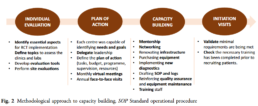NEWS
Category : INTENSE-TBM | Date : Juin 13, 2022
June 2022 – Capacity Building in Sub-Saharan Africa as Part of the INTENSE-TBM Project During the COVID-19 Pandemic
Ariza-Vioque E, Ello F, Andriamamonjisoa H, Machault V, González-Martín J, Calvo-Cortés MC, Eholié S, Tchabert GA, Ouassa T, Raberahona M, Rakotoarivelo R, Razafindrakoto H, Rahajamanana L, Wilkinson RJ, Davis A, Maxebengula M, Abrahams F, Muzoora C, Nakigozi N, Nyehangane D, Nanjebe D, Mbega H, Kaitano R, Bonnet M, Debeaudrap P, Miró JM, Anglaret X, Rakotosamimanana N, Calmy A, Bonnet F, Ambrosioni J; INTENSE-TBM Group. Capacity Building in Sub-Saharan Africa as Part of the INTENSE-TBM Project During the COVID-19 Pandemic. Infect Dis Ther. 2022 Jun 29:1–15.
doi: 10.1007/s40121-022-00667-z.
Tuberculous meningitis (TBM) is the most severe and disabling form of tuberculosis (TB), with at least 100,000 cases per year and a mortality rate of up to 50% in individuals co-infected with human immunodeficiency virus type 1 (HIV-1). To evaluate the efficacy and safety of an intensified anti-tubercular regimen and an anti-inflammatory treatment, the INTENSE-TBM project includes a phase III randomised clinical trial (TBM-RCT) in four countries in sub-Saharan Africa (SSA). Within this framework, we designed a comprehensive capacity-building work package ensuring all centres had, or would acquire, the ability to conduct the TBM-RCT and developing a network of skilled researchers, clinical centres and microbiology laboratories. Here, we describe these activities, identify strengths/challenges and share tools adaptable to other projects, particularly in low- and lower-middle income countries with heterogeneous settings and during the coronavirus disease 2019 (COVID-19) pandemic. Despite major challenges, TBM-RCT initiation was achieved in all sites, promoting enhanced local healthcare systems and encouraging further clinical research in SSA. In terms of certified trainings, the achievement levels were 95% (124/131) for good clinical practice, 91% (39/43) for good clinical laboratory practice and 91% (48/53) for infection prevention and control. Platform-based research, developed as part of capacity-building activities for specific projects, may be a valuable tool in fighting future infectious diseases and in developing high-level research in Africa.

